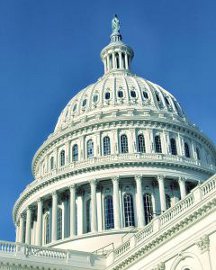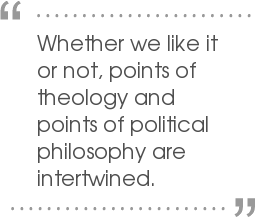Apolitical Faith? Objections to Christian Political Engagement, Part 2
 Read Part 1.
Read Part 1.
Should Christians be engaged in the American political process? Should involvement in politics ever go beyond a bit of reading and vote-casting? Do pastors and teachers have an obligation to address political topics? Should churches be involved in any way?
Many doctrinally-serious evangelicals and fundamentalists are now answering all of these questions in the negative. But do their objections to Christian political engagement justify keeping political thought and activity to such a minimum? In Part 1 of this series, I began considering and answering several representative objections to more-than-voting involvement in politics. Here, I’ll evaluate several more objections.
First, some attention to the meaning of “political engagement” may be helpful.
Forms and levels of political engagement
For the purposes of this article, “engagement” occurs in two forms and on many levels. The form of engagement may consist of involvement with the ideas or involvement with the process—or both of these. We are ideologically engaged when we ponder points of political (and social) philosophy that relate to the political issues facing our society and seek to think biblically about them. We are involved in the process whenever we act to influence the choice of leaders or policies, whether the action is writing a letter to the editor of the local paper, calling a legislator, marching in a rally or simply casting a vote.
These forms of engagement also occur on many levels. At the most basic, minimal level, idea engagement means listening to the claims of political figures and considering whether they are true in light of what we already know from Scripture. Engagement at the deepest level might take the form of earning a PhD in political theory or writing a book, working for a think-tank, or touring the country on a lecture series.
Casting a vote is pretty much the minimal level of process engagement. Arguably, putting a bumper sticker on the car is more visible but less influential on the final result of an election or policy decision. Deeper levels of engagement range from passing out campaign literature, to donating, to joining a campaign staff, to holding public office.
Discussion
Apolitical Faith? Objections to Christian Political Engagement, Part 1
 Meet the apolitical right
Meet the apolitical right
“I’m apolitical,” a pastor friend told me not long ago. His tone and body language communicated disdain for the whole business of candidates, legislation and public policy. The response I did not verbalize was, “Great. Another one.”
This apolitical attitude seems to be on the rise among theologically serious (especially gospel-serious) evangelicals and fundamentalists. An underlying conviction seems to be that the Bible and Christian living have nothing at all to do with any political agenda. Ministry and true discipleship are only hindered by attention to political matters. To the most passionate apoliticals, the correct course is not a matter of balance (moderation in political engagement) or discipline (proper limits on the kind of political engagement). It’s a matter of purity: faith and ministry should not mix themselves in any way with the poison of politics.1
In practice, this means churches should avoid taking positions on matters perceived to be “political issues,” and pastors and teachers should refrain from teaching and preaching on political topics. Above all, believers should not express their political views in any way that might alienate someone with whom they hope to have a gospel witness. Having a mild interest in politics and casting a vote on election day is okay, but going beyond that is heading down the wrong road.
A variety of factors motivate the apoliticals I’ve interacted with. Some simply have temperaments that are deeply averse to the conflict and strife of politics. Others have absorbed some of the thinking of the evangelical left (such as the “Red Letter Christian” fondness for pitting the supposed teaching of Jesus against the rest of Scripture rather than interpreting Jesus in light of the rest of Scripture).2 In almost every case, constituents of the apolitical right see the Moral Majority efforts of the 1980s as a travesty and decry anything today that seems similar.
Whatever the primary motivation, apoliticals offer specific objections to all but the most mild and private forms of political engagement.

Discussion